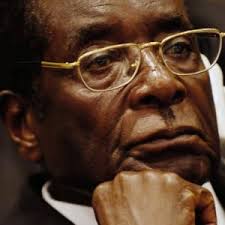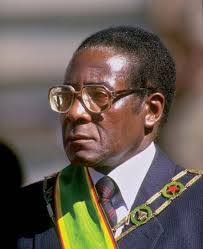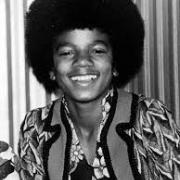Robert Mugabe Biography
 Robert Mugabe has served as prime minister of Zimbabwe since 1980, and has been the nation's president since 1987. He has been re-elected to the presidency multiple times, but elections have reportedly been tainted by fraud and voter intimidation.
Robert Mugabe has served as prime minister of Zimbabwe since 1980, and has been the nation's president since 1987. He has been re-elected to the presidency multiple times, but elections have reportedly been tainted by fraud and voter intimidation.Robert Mugabe was born on February 21, 1924, in Kutama, Southern Rhodesia (now Zimbabwe). In 1963, he founded ZANU, a resistance movement against British colonial rule. In 1980, when British rule ended, Mugabe became prime minister of the new Republic of Zimbabwe. In 1987, he was elected president of Zimbabwe. Since 2008, Mugabe has shared power with Morgan Tsvangirai.
Younger Years
Robert Gabriel Mugabe was born on February 21, 1924, in Kutama, Southern Rhodesia (now Zimbabwe), just months after Southern Rhodesia had become a British Crown colony. As a result, the people of his village were oppressed by new laws and faced limitations to their education and job opportunities.
Mugabe's father was a carpenter. He went to work at a Jesuit mission in South Africa when Mugabe was just a boy, and mysteriously never came home. Mugabe's mother, a teacher, was left to bring up Mugabe and his three siblings on her own. As a child, Mugabe helped out by tending the family's cows and making money through odd jobs.
Although many people in Southern Rhodesia went only as far as a grammar school, Mugabe was fortunate enough to receive a good education. He attended school at the local Jesuit mission under the supervision of school director Father O'Hea. A powerful influence on the boy, O'Hea taught Mugabe that all people should be treated equally and educated to the fulfillment of their abilities. Mugabe's teachers, who called him "a clever lad," were early to recognize his abilities as considerable.
The values that O'Hea imparted to his students resonated with Mugabe, prompting him to pass them on by becoming a teacher himself. Over the course of nine years, he studied privately while teaching at a number of mission schools in Southern Rhodesia. Mugabe continued his education at the University of Fort Hare in South Africa, graduating with a Bachelor of Arts degree in history and English in 1951. Mugabe then returned to his hometown to teach there. By 1953, he had earned his Bachelor of Education degree through correspondence courses.
teacher himself. Over the course of nine years, he studied privately while teaching at a number of mission schools in Southern Rhodesia. Mugabe continued his education at the University of Fort Hare in South Africa, graduating with a Bachelor of Arts degree in history and English in 1951. Mugabe then returned to his hometown to teach there. By 1953, he had earned his Bachelor of Education degree through correspondence courses.
In 1955, Mugabe moved to Northern Rhodesia. There, he taught for four years at Chalimbana Training College while also working toward his Bachelor of Science degree in economics through correspondence courses with the University of London. After moving to Ghana, Mugabe completed his economics degree in 1958. He also taught at St. Mary's Teacher Training College, where he met his first wife, Sarah Heyfron, whom he would marry in 1961. In Ghana, Mugabe declared himself a Marxist, supporting the Ghanaian government's goal of providing equal educational opportunities to the formerly designated lower classes.
Early Political Career
In 1960, Robert Mugabe returned to his hometown on leave, planning to introduce his fiancée to his mother. Unexpectedly, upon his arrival, Mugabe encountered a drastically changed Southern Rhodesia. Tens of thousands of black families had been displaced by the new colonial government, and the white population had exploded. The government denied black majority rule, resulting in violent protests. Mugabe too was outraged by this denial of blacks' rights. In July 1960, he agreed to address the crowd at the protest March of 7,000, staged at Salisbury's Harare Town Hall. The purpose of the gathering was for members of the opposition movement to protest the recent arrest of their leaders. Steeling himself in the face of police threats, Mugabe told the protestors about how Ghana had successfully achieved independence through Marxism.
Just weeks later, Mugabe was elected public secretary of the National Democratic Party. In accordance with Ghanaian models, Mugabe quickly assembled a militant youth league to spread the word about achieving black independence in Rhodesia. The government banned the party at the end of 1961, but the remaining supporters came together to form a movement that was the first of its kind in Rhodesia. Membership of the Zimbabwe African People's Union grew to a staggering 450,000. Its voice refused to be silenced. The union's leader, Joshua Nkomo, was invited to meet with the United Nations, who demanded that Britain suspend their constitution and readdress the topic of majority rule. But, as time passed and nothing had changed, Mugabe and others were frustrated that Nkomo didn't insist on a definite date for changes to the constitution. So great was his frustration, that by April of 1961, Mugabe publicly discussed starting a guerilla war--even going so far as to declare defiantly to a policeman, "We are taking over this country and we will not put up with this nonsense."
In 1963, Mugabe and other former supporters of Nkomo founded their own resistance movement, called the Zimbabwe African National Union, or ZANU, in Tanzania. Back in Southern Rhodesia later that year, the police arrested Mugabe and sent him to Hwahwa Prison. Mugabe would remain in jail for over a decade, being moved from Hwahwa Prison to Sikombela Detention Centre and later to Salisbury Prison. In 1964, while in prison, Mugabe relied on secret communications to launch guerilla operations toward freeing Southern Rhodesia from British rule.
In 1974, Prime Minister Ian Smith, who claimed he would achieve true majority rule but still declared his allegiance to the British colonial government, allowed Mugabe to leave prison and go to a conference in Lusaka, Zambia (formerly Northern Rhodesia). Mugabe instead escaped back across the border to Southern Rhodesia, assembling a troop of Rhodesian guerilla trainees along the way. The battles raged on throughout the 1970s. By the end of that decade, Zimbabwe's economy was in worse shape than ever. In 1979, after Smith had tried in vain to reach an agreement with Mugabe, the British agreed to monitor the changeover to black majority rule and the UN lifted sanctions.
By 1980, Southern Rhodesia was liberated from British rule and became the independent Republic of Zimbabwe. Running under the ZANU party banner, Mugabe was elected prime minister of the new republic, after running against Nkomo. In 1981, a battle broke out between ZANU and ZAPU due to their differing agendas. In 1985, Mugabe was re-elected as the fighting continued. In 1987, when a group of missionaries were tragically murdered by Mugabe supporters, Mugabe and Nkomo at last agreed to merge their unions and focus on the nation's economic recovery.
Presidency
Within just a week of the unity agreement, Mugabe was appointed president of Zimbabwe. He chose Nkomo as one of his senior ministers. Mugabe's first major goal was to restructure and repair the country's failing economy. In 1989, he set out to implement a five-year plan, which slackened price restrictions for farmers, allowing them to designate their own prices. By 1994, at the end of the five-year period, the economy had seen some growth in the farming, mining and manufacturing industries. Mugabe additionally managed to build clinics and schools for the black population. Also over the course of that time, Mugabe's wife, Sarah, passed away, freeing him to marry his mistress, Grace Marufu.
By 1996, Mugabe's decisions had begun to create unrest among the citizens of Zimbabwe, who had once hailed him as a hero for leading the country to independence. Many resented his choice to support the seizure of white people's land without compensation to the owners, which Mugabe insisted was the only way to level out the economic playing field for the disenfranchised black majority. Citizens were likewise outraged by Mugabe's refusal to amend Zimbabwe's one-party constitution. High inflation was another sore subject, resulting in a civil servant strike for pay increases. The self-awarded pay raises of government officials only compounded the public's resentment toward Mugabe's administration.
Objections to Mugabe's controversial political strategies continued to impede his success. In 1998, when he appealed to other countries to donate money for land distribution, the countries said they wouldn't donate unless he first devised a program for helping Zimbabwe's impoverished rural economy. Mugabe refused, and the countries refused to donate.
In 2000, Mugabe passed an amendment to the constitution that made Britain pay reparations for the land it had seized from blacks. Mugabe claimed that he would seize British land as restitution if they failed to pay. The amendment put further strain on Zimbabwe's foreign relations.
Still, Mugabe, a notably conservative dresser who during his campaign had worn colorful shirts with his own face on them, won the 2002 presidential election. Speculation that he had stuffed the ballot box led the European Union to place an arms embargo and other economic sanctions on Zimbabwe. At this time Zimbabwe's economy was in near ruins. Famine, an AIDS epidemic, foreign debt and widespread unemployment plagued the country. Yet Mugabe was determined to retain his office and did so by any means necessary—including alleged violence and corruption—winning the vote in the 2005 parliamentary elections.
On March 29, 2008, when he lost the presidential election to Morgan Tsvangirai, leader of the opposing Movement for Democratic Change, Mugabe was unwilling to let go of the reins. Mugabe demanded a recount. A runoff election was to be held that June. In the meantime, MDC supporters were being violently attacked and killed by members of Mugabe's opposition. When Mugabe publicly declared that as long as he was living, he would never let Tsvangirai rule Zimbabwe, Tsvangirai concluded that Mugabe's use of force would skew the vote in Mugabe's favor anyway, and withdrew.
Mugabe's refusal to hand over presidential power led to another violent outbreak that injured thousands and resulted in the death of 85 of Tsvangirai's supporters. That September, Mugabe and Tsvangirai agreed to a power-sharing deal. Ever determined to remain in control, Mugabe still managed to retain most of the power by controlling security forces and choosing leaders for the most vital ministry positions.
At the end of 2010, Mugabe took additional action to seize total control of Zimbabwe by selecting provisional governors without consulting Tsvangirai. A U.S. diplomatic cable indicated that Mugabe might be battling prostate cancer the following year. The allegation raised public concerns about a military coup in the event of Mugabe's death while in office. Others have voiced concerns about the possibility of violent internal war within the ZANU-Patriotic Front (ZANU-PF) Party, should candidates compete to become Mugabe's successor.
2013 Election
On December 10, 2011, at the National People's Conference in Bulawayo, Mugabe officially announced his bid for the 2012 Zimbabwe presidential election. The election was postponed, however, as both sides agreed to draft a new constitution, and rescheduled for 2013. People of Zimbabwe came out in support of the new document in March 2013, approving it in a constitution referendum, but many believe that the 2013 presidential election will be marred by corruption and violence.
According to a Reuters report, representatives from nearly 60 civic organizations within the country have complained of a crackdown by Mugabe and his supporters. Critical of Mugabe, members of these groups have been subject to intimidation, arrest and other forms of persecution. There is also a question as to who will be allowed to supervise the voting process. Mugabe has said that he will not let westerners monitor any of the country's election.
Tsvangirai is Mugabe's main opponent, and 2013 marks the third time he is challenging Mugabe. Mugabe seems confident that he will emerge as the country's sole leader once again. Addressing his supporters on his 89th birthday in March, he stated, "We will win the elections," according to a Bloomberg news article.
Later that month, Mugabe again made international headlines when he traveled to Rome for the inaugural mass for Pope Francis, who was newly named to the papacy. Mugabe told reporters that the new pope should visit Africa and stated, "We hope he will take us all his children on the same basis, basis of equality, basis that we are all in the eyes of God equal," according to a report by The Associated Press.
In late July 2013, amidst discussion regarding the current and highly anticipated Zimbabwean election, an 89-year-old Mugabe made headlines when he was asked whether he planned to run again in the 2018 election (he would be 94 then) by a reporter from The New York Times, to which the president responded, "Why do you want to know my secrets?" According to the Washington Post, Tsvangirai has accused election officials of throwing out nearly 70,000 ballots in his favor that were submitted early.
In early August, Zimbabwe's election commission declared Mugabe the victor in the presidential race. He earned 61 percent of the vote with his opponent Tsvangirai receiving only 34 percent, according to BBC News. Tsvangirai is expected to launch a legal challenge against the election results. According to the Guardian newspaper, Tsvangirai said the election did "not the reflection of the will of the people. I don't think that even those in Africa that have committed acts of ballot rigging have done it such a brazen manner."

